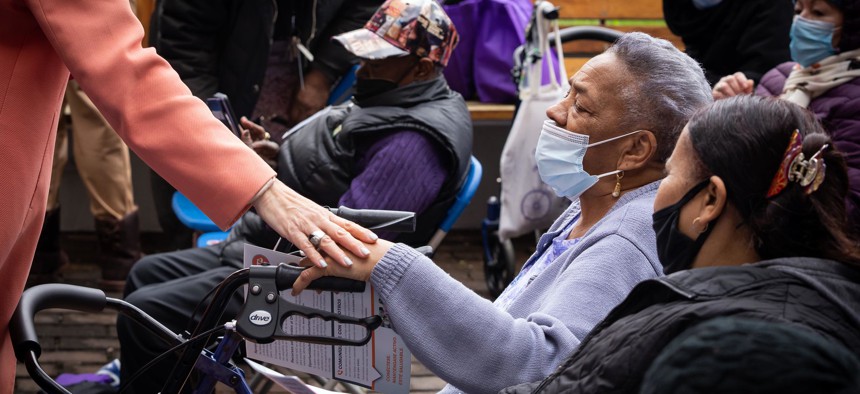Opinion
Commentary: Keeping older New Yorkers safe
Ensuring elderly justice is a priority with rising concerns over crime.

Attendees at a New York City Department for the Aging event at Borinquen Court in the Bronx. Credit: Ed Reed/Mayoral Photography Office)
Working with older adults in New York City is incredibly rewarding. With over 300 older adult centers, we get to see residents celebrate birthday parties, participate in dancing, singing, art and exercise classes, and get to call it work! But there is another area critical to our mission – elder justice.
Anyone who follows the news has seen a story about an older New Yorker who was assaulted on the subway, robbed on the street, or randomly attacked. These are some of the most vulnerable members of our community and they should not have to worry about their safety.
Unfortunately, crimes and abuse against the elderly happen far too often, and studies have shown that of every case reported, many others are not because victims are embarrassed, ashamed or afraid, but there is help.
This summer, Mayor Eric Adams and the Department for the Aging announced the expansion of the City’s Elder Justice Program, which helps older victims of crime and abuse with support and services. Our elder justice network already had offices in each borough, but have added additional ones in Queens, Brooklyn and the Bronx, because of the increased number of residents living in them. Each year, program staff at these organizations support about 2,000 victims with case assistance, crisis intervention, safety planning and counseling, and at times can retain compensation through the New York State Office of Victim Services.
Our strong partnership with the Police Department allows the network and our Elderly Crime Victims Resource Center to directly connect older victims who report a crime to the programs they need. This collaboration will ensure older residents get both police case assistance, as well as the support and social services that we provide. The three-year pilot program, which began in September, operates in NYPD Patrol Borough Manhattan North, which covers police precincts north of 59th Street, and the 5th Police Precinct in Chinatown. This program is particularly important in Chinatown, which experienced many hate crimes during the COVID-19 pandemic, that included elderly victims.
With this new collaboration we have already received around 300 referrals per month from the NYPD. Another key aspect of our partnership with NYPD offers specialized education programs to recruits at the police academy, so they can recognize the signs of elder abuse and crime and how to properly respond to these cases.
Albany has also taken action by adding identity theft as one of the forms of elder abuse in New York. This is important given the variety of clever, predatory practices, used on vulnerable older adults.
We all have a personal responsibility to prevent these incidences of elder abuse and crimes from taking place, and now with these expanded resources and partnerships, we can all do our part to make sure older New Yorkers are safe.
Lorraine Cortés-Vázquez is the Commissioner for the NYC Department for the Aging.
NEXT STORY: Commentary: When police become our government
